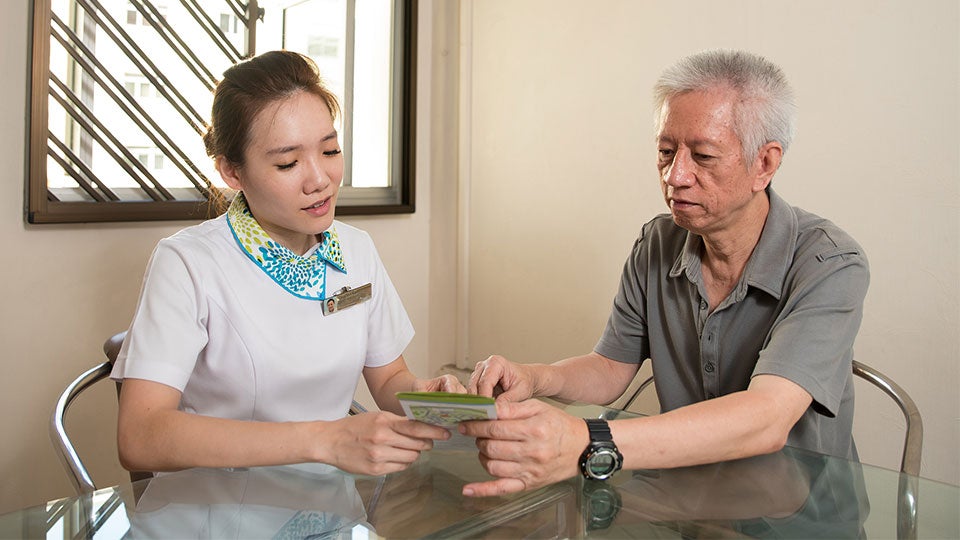NUS launches Graduate Diploma in Community Health Nursing
Published: 02 Oct 2018

Registered nurses in Singapore can now enrol in a new part-time post-graduate diploma in community health nursing.
The Graduate Diploma in Community Health Nursing offered by the NUS Alice Lee Centre for Nursing Studies (NUS Nursing) is the first part-time post-graduate programme in Singapore that allows working nurses to study for credentialisation in community healthcare.
The programme is delivered in six modules to give them flexibility in pursuing part- time study. With the completion of a module, students are awarded a certificate that can be accumulated towards the Graduate Diploma. Serving nurses can take two to five years to complete the modules, which do not have to be taken in any fixed sequence, thus allowing them to juggle work and study commitments.
Registration for the academic year starting January 2019 is now open. The programme is open to registered nurses with a degree as well as one year of working experience in a community setting.
It provides another pathway for working nurses to deepen nursing competencies.
NUS Nursing has been a provider of Continuing Education Training (CET) for nurses aiming to obtain postgraduate qualifications through its Master of Nursing, Master of Science (Nursing) and PhD programmes.
“We wish to encourage nurses to expand lifelong learning, and help them train, specialise and upgrade professionally to practise and deliver care at their fullest potential. However, we also know that nursing is a demanding job. Our new training framework thus has a strong emphasis on modularised and applied training, featuring short-term, customised courses based on the continuing education needs of in-service nurses to cater to their working arrangements and commitments,” said Professor Emily Ang, Head, NUS Nursing.
A rising area of need in Singapore
The course, accredited by the Singapore Nursing Board, is designed to provide students with a strong foundation in community health nursing. This is an emerging area of need in Singapore’s nursing landscape and is defined by the World Health Organisation as a “population-focused, community-oriented approach aimed at health promotion of an entire population, and prevention of disease, disability and premature death in a population. Hence, community health nursing practice synthesises nursing theory and public health science, and places priority on prevention, protection and promotion of health.”1
Associate Professor M Kamala Devi, Director of Education (CET) at NUS Nursing, explained that registered nurses working in the community are required to make decisions and offer treatment with a high level of autonomy and independence. “The course provides nurses with a deeper understanding of community healthcare and its underlying concepts, with opportunities to explore evidence-based approaches and consider application to practice,” she said.
“We are training leaders in community health nursing who can help to drive care transformation and strengthen the continuity of care between hospital and community. Graduates from the course will not only be able to provide direct patient care and perform advanced health assessment, they will play a consultative role for patients with complex needs, serve as the first line of escalation on the next level of care, and develop collaborative care planning with the interdisciplinary team for their clients,” she added.
The programme is designed in close consultation with community nursing professionals to align with industry demands and community needs. It complements the Health Ministry’s strategies and efforts to build capabilities in Singapore’s nursing workforce, strengthen community nursing and increase the number of trained community nurses to meet the needs of our rapidly ageing population and the rising incidence of chronic diseases. The course will be taught by NUS Nursing academics as well as practising nursing professionals.
Ms Ong Shu Fen, Community Nurse from Khoo Teck Puat Hospital, said: “The training needs of community nurses are quite distinct from those working in the acute care sector where I previously practised and trained. Community nursing requires me to think on my feet and be a lot more independent. In addition to being competent in basic nursing skills and knowledge, community nurses need to have a variety of specialist nursing knowledge, as well as basic medical and allied healthcare knowledge and skills to manage patients in the community. By providing formal training in the areas relevant to community nursing practice, this course can augment the competence and confidence of nurses starting out in this field.”
1. World Health Organisation, A Framework for Community Health Nursing Education
See Press Release and click here for more details on the course.

